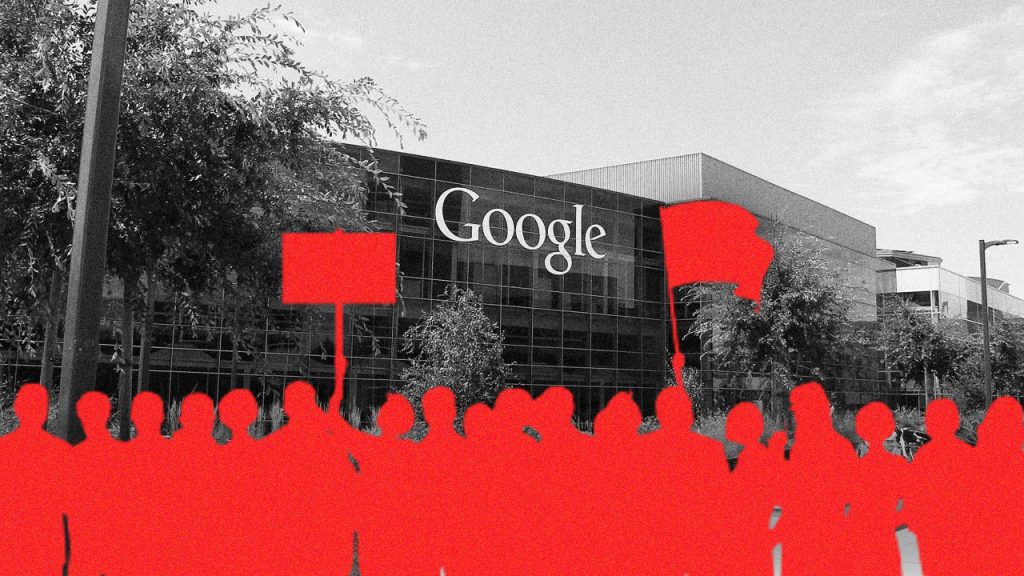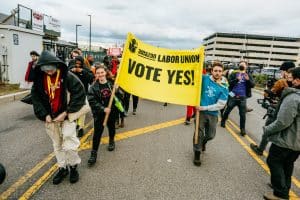Raksha Muthukumar is a software engineer at Google and member of the Alphabet Workers Union. The AWU, which currently has around 800 members, is a “minority” or “non-contract” union that has not sought NLRB recognition. Left Voice correspondent Rose Lemlich interviewed Muthukumar by phone on February 4 to discuss the union in more depth, and its future implications.
When did you first hear about organizing at Alphabet?
Summer 2019. I got connected through this conference called Take Back Tech, that Mijente hosted down in San Jose. And when I was there I met Meredith Whittaker, and learned a lot about her experience organizing the walkout, and that was a really big part of it for me. Then this year, I was in touch with union organizers by July or August-ish, and I officially signed my union card in October.
What convinced you that Alphabet workers need a union?
I’ve always really believed in worker organizing. I guess the biggest question was: Is the union the right fit for the organizing work we were already doing, with all the petitions and walkouts and ways we were advocating? It kind of increasingly felt like it was, because we were seeing so much retaliation, and the communication channels were unclear. I think having a centralized entity started to feel really appealing — especially after the Thanksgiving Four were fired.
In regards to protection from retaliation, how are you picturing the Alphabet Workers Union (AWU) — since you’re set up as a non-contract union — is going to be able to help your coworkers with that?
Actually, we just filed a suit this morning! A worker who had been retaliated against for organizing, I think in the data center — AWU is suing on her behalf. That’s huge. We’re putting our name on it, and standing up for another worker. That’s amazing.
From the beginning, the AWU has said that membership is open to all employees at Alphabet companies, regardless of whether they’re full-time, part-time, contract, or temp, and regardless of their workplace. Software engineers and data center workers obviously work in different places and have very different job descriptions. How would you describe the solidarity in your union right now between workers in different companies, workplaces, and employment statuses?
One of the strengths of our union is that we’re not going exactly by the guidelines of the NLRB recognition of unions, which usually means everybody is in the same job role, and can negotiate for salaries, and you need a majority of those workers. I think not confining ourselves to that has allowed us to do a lot of different things. We can open our doors to people doing different kinds of work. We can open our doors to immigrants, maybe even to lower-level managers, which is really huge. Our power comes from all of us standing up together, and that’s how we can have the biggest impact and leverage on the company.
When we talk about organizing across the company and having those dialogues open — until we started this formal structure, I didn’t personally have contact with anybody in the AI realm, like the research scientists are over there. But Dr. Timnit Gebru [a researcher who worked on AI at Google and spoke up about ethical issues] was fired in November, and there’s been so much organizing from that quadrant, and being able to support their work there has been really interesting. And beyond that, I feel like we have lots of committees, and lots of subgroups and workplace units, so people can advocate for what affects them the most and have the whole power of the union behind them when they need that.
That’s incredibly powerful — for people in specific sections of the workplace to be able to say specifically what the issues are that affect them, and then know that everybody else will have their back.
Right.
I wanted to ask about a couple of press releases the AWU has put out going back a few weeks, about the events on January 6th at the Capitol. The AWU published a statement about fighting right-wing extremism on YouTube. Tell me about how that came together.
There’s a feeling like there’s not many incentives for Google and big tech companies in general outside of profit. Like, almost nothing. There’s very little regulation and very little incentive to listen to any regulation. But there’s the idea that we as workers can give another incentive, by leveraging our labor. And it really felt that way, seeing those Capitol riots: What is our role in this? Other than us standing up and saying “we won’t work on this,” what is Google’s incentive to shut down something like that? That [the riot] is like, huge publicity, huge, whatever, clicks. I don’t know, it felt like a very natural extension of why we started this initiative at all — to have leverage at the table when Google does things like that or has a role in things like that.
So, this is a non-directly bread-and-butter issue. Obviously one that affects all of you as workers, even within the workplace — but absolutely outside of the workplace. But standing up against it is not the kind of role that most Americans these days think of unions playing in the workplace and not the kind of issue that most people think of unions tackling. What role do you see the AWU taking on other non-bread-and-butter issues in the workplace in the future? Or even outside of your specific workplaces?
There’s so much we can do. We’re not limited to what the NLRB says our rights are protected to do. We can come together and use our channels of communication on anything we vote to do as a democracy. If everybody feels like a firing was really unjust, yes, we can organize around that, but if everybody also feels like Google working on police contracts is really unethical, even if that doesn’t affect any of our personal labor, I think that it’s really great that we have the leverage to [work on fighting] that as well. It’s such a multifaceted vehicle. We’re really redefining modern unions. America is really ready for a rebranding in unions. Figuring out how we’re challenging power dynamics and how we can use our privilege is a really important part of it as well.
I think of our union as an all-encompassing vehicle for democracy in the workplace, in that you don’t really have that vehicle [anywhere else]. We don’t have workers’ councils like they do in the European Union. There’s so much stuff we could advocate for, seeing as we’re just a workers’ voice amplifier.
When people see us unionizing, one of the quickest criticisms is that “Google always treats its workers well, what are you complaining about, you should be grateful for this job.” One of the biggest things we’re challenging as a “big-tech, treated-well, privileged workers” concept is that “grateful for your job” is pretty outdated — or actually just regressive in general. I don’t think there was ever a time when that made sense. Trading your labor is … you’re not being done a favor by agreeing to that reality. There’s no reason that we go into the workplace, 40-plus hours a week, and give up our voice and our democracy and our own desires and ethics. Reclaiming all that is a really important role of unions.
I’m wondering whether the conversation that you have with your coworkers about joining the union changes at all, depending on who you’re talking to. What do you say when you’re having an outreach conversation with someone who isn’t a software engineer or in a “white-collar” job?
One of my closer friends from before the union stuff has done work as an ASL translator at Google and other big tech companies. Keeping her work and her experiences in mind has been a really big part of my personal union experience. I think it is really different. People who work in different types of roles feel different kinds of fear about retaliation or not landing in a job that’s as stable, etc. [if they get fired in retaliation for organizing]. But that opens folks up more to being taken advantage of. And the way I had those conversations is, “This is our time to come together, and we’re here to support you.” When I talk to software engineers, it’s more “This is our chance to support other people, and take responsibility for the work we do at a big tech company.” And when I talk to other folks it’s more, “No, the tables have been unequal for long enough. What do you want from us? What can we do for you? What would you want to see out of your union?”
What advice do you have for tech workers in other companies who are interested in organizing in our sector? Both in the process before going public, and in the process of announcing to the world and your boss that you have organized?
I’ve been talking to people at a lot of tech companies recently, and it’s so exciting! I think we’re going to see a crop of tech unions in the next couple of years. People are in the early planning stages, starting to have conversations. I guess I would say … just start talking to your coworkers — even if you don’t think a union is going to suit your company based on its size. Really, all it is is talking to your coworkers, finding out what they love about their jobs, what is a sour point for them, what they would change if they had the ability to change it. It’s just about starting a conversation and building those relationships, and then standing by each other. That’s really all a union is.
I think I want people to know how, when we talk about it, we always talk about the struggle. Which it is. Retaliation is really scary. Planning all these things is hard. Running a democracy, setting up new systems, onboarding new people … it is a struggle. But I also feel like I’ve made fantastic friends, people who have my back. I feel better at my job just knowing that I have people who believe in me when I talk about performance reviews, or who help me deal with my manager, or help me deal with my imposter syndrome. Just finding a community of people who have similar values to me and see different sides of me than I usually get to show to coworkers has been really good for my mental health, and just a general sense of purpose and happiness at work, honestly.
My friends and I like to joke that the union is the friends we made along the way!
I literally tweeted that like two days ago!











